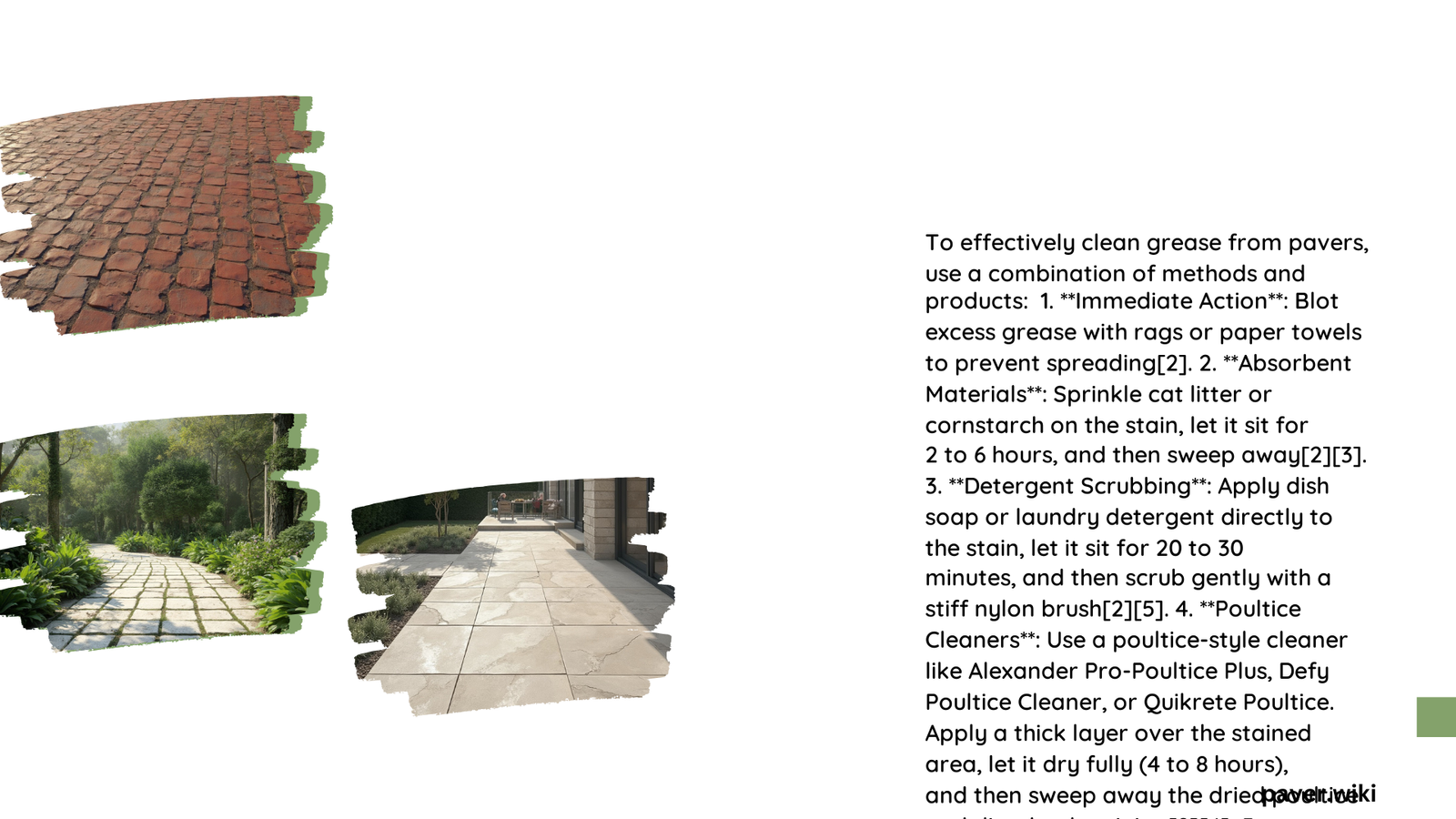Cleaning grease from pavers requires specialized products and techniques. Effective solutions include commercial degreasers like World’s Best Paver & Hard Surface Detergent, Techniseal Dirt & Grease Cleaner, and SRW Products CDX Cleaner & Degreaser X-Treme™. These products, along with natural methods such as vinegar and baking soda, can effectively remove grease stains from various types of pavers. Proper application and consideration of surface compatibility are crucial for optimal results.
What Are the Most Effective Commercial Degreasers for Pavers?
When it comes to removing grease from pavers, several commercial products stand out for their effectiveness:
- World’s Best Paver & Hard Surface Detergent Cleaning Concentrate (WB0090)
- Biodegradable and phosphate-free
- Highly effective against grease, grime, and oil stains
- Can be diluted up to 1:100 with water
-
Suitable for various hard surfaces including pavers, concrete, and asphalt
-
Techniseal Dirt & Grease Cleaner
- Specifically designed for concrete pavers
- Effective on both sealed and unsealed surfaces
- Dissolves, dislodges, and encapsulates grease
-
Removes fresh and set-in grease stains
-
SRW Products CDX Cleaner & Degreaser X-Treme™
- Concentrated spot treatment
- Non-acidic formula
- Effective on grease, oil, tar, and other stubborn stains
- Suitable for various hardscape surfaces
How Do Natural Methods Compare to Commercial Products?

While commercial degreasers are highly effective, natural methods can also be useful for lighter grease stains:
- Vinegar and Water Solution
- Mix equal parts white vinegar and water
- Apply to pavers and let sit for about an hour
-
Eco-friendly and cost-effective option
-
Baking Soda Paste
- Create a paste with baking soda and warm water
- Apply to stained area and let sit for at least an hour
- Scrub and rinse thoroughly
Natural methods are generally less harsh on pavers but may require more effort and multiple applications for stubborn stains.
What Is the Proper Application Method for Cleaning Grease from Pavers?
To effectively clean grease from pavers, follow these steps:
- Preparation
- Wear protective gear (gloves and eyewear)
-
Clear the area of debris
-
Product Application
- For commercial degreasers:
- Dilute if required (e.g., WB0090 can be diluted up to 1:100)
- Apply directly to the stained area
-
For natural methods:
- Apply vinegar solution or baking soda paste to the stain
-
Dwell Time
- Allow the cleaning solution to sit for 10-30 minutes (commercial products)
-
For natural methods, let sit for about an hour
-
Scrubbing
- Use a stiff brush to agitate the cleaner into the stain
-
For stubborn stains, repeat the process
-
Rinsing
- Thoroughly rinse the area with clean water
- Use a garden hose or pressure washer (maintain at least 2 feet distance)
What Factors Should Be Considered When Choosing a Grease Cleaner for Pavers?
Several factors should be taken into account when selecting a grease cleaner for pavers:
- Paver Material
- Different cleaners may be more suitable for specific paver types
-
Always test on a small, inconspicuous area first
-
Stain Severity
- Light stains may respond well to natural methods
-
Stubborn or old stains often require commercial degreasers
-
Environmental Impact
-
Consider biodegradable and phosphate-free options for eco-friendliness
-
Sealer Compatibility
-
Ensure the cleaner is safe for use on sealed pavers if applicable
-
Cost
- Commercial products range from $20 to $100 per unit
-
Natural methods are generally more cost-effective
-
Ease of Use
- Some products require dilution, while others are ready to use
- Consider the application method and required equipment
What Are the Challenges in Cleaning Grease from Pavers?
Cleaning grease from pavers can present several challenges:
- Porous Surface
- Pavers often have porous surfaces that can absorb grease deeply
-
This may require multiple cleaning attempts or stronger solutions
-
Risk of Damage
- Harsh chemicals or improper pressure washing can damage pavers
-
Always follow manufacturer instructions and test in an inconspicuous area
-
Environmental Conditions
- Extreme temperatures or direct sunlight can affect cleaner effectiveness
-
Choose an appropriate time and weather conditions for cleaning
-
Stain Age
- Older stains may be more difficult to remove
-
Prompt cleaning of fresh stains is ideal
-
Sealer Removal
- Some cleaners may strip sealers from pavers
- Re-sealing may be necessary after cleaning
How Can Grease Stains on Pavers Be Prevented?
Prevention is key to maintaining clean pavers:
- Regular Cleaning
- Implement a routine cleaning schedule
-
Address spills immediately to prevent set-in stains
-
Protective Sealing
- Apply a quality paver sealer to create a protective barrier
-
Reapply sealer as recommended by the manufacturer
-
Use of Mats
- Place mats or drip pans in areas prone to grease spills
-
Particularly useful in outdoor kitchen or barbecue areas
-
Proper Drainage
-
Ensure proper drainage to prevent grease from pooling on pavers
-
Education
- Inform family members or employees about proper care and immediate spill cleanup
By following these preventive measures, you can significantly reduce the occurrence of grease stains on your pavers and maintain their appearance for longer periods.
In conclusion, cleaning grease from pavers requires a combination of the right products, proper application techniques, and consideration of various factors such as paver material and stain severity. Whether using commercial degreasers or natural methods, consistent care and prompt attention to spills are key to maintaining clean and attractive paver surfaces.
References:
1. WB0090 World’s Best Paver & Hard Surface Detergent Cleaning Concentrate | Biodegradable
2. Powerful Paver Cleaners for Any Hardscape Project – SRW Products
3. Dirt & Grease Cleaner – Hardscape Stain Remover – Techniseal
